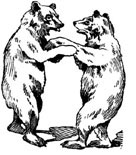
Hospitality
A LOST ART?
Throughout the Odyssey, Homer’s epic that distinguishes between the civilized and the barbarians — between those who know the art of “living well” (Aristotle’s phrase) like the Phaeacians and those who only live in the sense of mere survival like the Cyclops — the rituals of hospitality always feature banquets to honor the visitor:
A maid came with water in a beautiful golden ewer and poured it out over a silver basin so that he could wash his hands. Then she drew a wooden table to his side, and the staid housekeeper brought some bread and put it by him with a choice of dainties, helping him liberally to all she could offer.
These feasts cultivate many virtues associated with the refinements of civilization. The hosts pour libations to the gods as an expression of gratitude for the gifts of food and drink. The banquet serves the traveler in an atmosphere that evokes beauty — the “beautiful golden ewer” and “the silver basin” reflecting choice dishware made with the best materials and fine craftsmanship. The host practices generosity in preparing the best foods and offering the heartiest portions. When Telemachus is a guest in Menelaus’s home, the host spares nothing in accommodating the needs of the traveler: “Meanwhile a carver dished up for them on platters slices of various meats he had selected from his board, and put gold cups beside them.” In these scenes of hospitality from the Odyssey, the participants savor the fruits of civilization that dignify and elevate human life beyond the mere struggle for survival.
Reverence for the gods, love of the beautiful, and the outpouring of liberality, however, mark only part of the occasion. The great banquets in the Odyssey also provide occasions for conversation and storytelling. As Odysseus sojourns in Phaeacia with King Alcinous, he recounts his adventures with the Cyclops, the Sirens, and the Scylla and Charybdis. The feast creates an opportunity for learning, for broadening one’s mind, for acquainting one’s self with men and manners, for hearing of the adventures of other travelers. Entertainment or games also accompany the rites of hospitality as the king summons the bard: “And let our glorious bard, Demodocus, be summoned. For no other singer has his heavenly gift of delighting our ears whatever theme he chooses for our song.” The feast calls to mind an important philosophical truth: Men work in order to play, leisure is the basis of culture, and certain human pursuits are ends in themselves.
You May Also Enjoy
Macbeth, Lear, Othello, Hamlet, Falstaff, Henry IV — are these immortal portraits of sinful humanity not the very crucible of Shakespeare’s art?
GKC asserts that Jesus was not merely one of many great figures in history; rather, He is at the center of all history: past, present, and future.
I remember reading Confession when I was in the second year of medical school, and…

